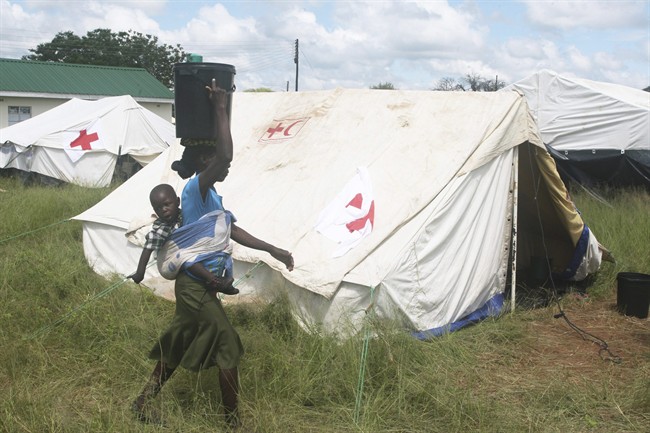HARARE, Zimbabwe – For months, they pleaded for rain. Now they’re dying from the downpour. Floods in Zimbabwe have killed nearly 250 people since December in regions that were recently suffering from drought.

This southern African country this week appealed to international donors for $100 million to help those affected by the floods, which have washed away bridges and roads and cut off some communities. President Robert Mugabe, currently in Singapore for a medical checkup, declared the floods to be a national disaster.
READ MORE: U.S. megadrought is around the corner: What it will mean to Canadians
Just last year, a regional drought largely induced by the El Nino weather phenomenon killed livestock and forced people to forage for food in forests and seek drinking water from parched river beds in many parts of Zimbabwe.
Desperate for rainfall, some people revived a long-abandoned tradition, dating to pre-colonial times, of rain-making ceremonies. In parts of Zimbabwe, traditional leaders and spirit mediums, with the support of the government, led ceremonies atop mountains and other sacred places to appeal to ancestral spirits for rain.
Others who no longer believe in traditional customs held Christian prayers.
WATCH: Zimbabwe’s black market targets women to be sold as wives

“Our people had forgotten their culture because of Westernization. See, now the ancestors responded, the heavens have opened in a big way. It is for the government to deal with the problems caused by the floods,” said George Kandiero, the president of Zimbabwe’s traditional healers’ association.
Since December, floods caused by heavy rains have killed 246 people, injured 128 and left nearly 2,000 homeless, Saviour Kasukuwere, Zimbabwe’s minister of local government, said Thursday.
The floods have mainly affected southern Zimbabwe, where the air force has transported some marooned villagers to safety. Some people are unable to reach clinics and schools. Dams have overflowed, raising concerns about communities living downstream.
Five bridges on major highways have been swept away nationwide, Transport Minister Joram Gumbo said.
“Our roads have deteriorated to the extent that some sections of the national road network have become impassable,” Zimbabwe’s Daily News newspaper quoted Gumbo as saying.
READ MORE: Rhino crushes tour guide to death in Zimbabwe
Roads in some urban areas were already littered with potholes, and the flooding has made it even harder to get around by car. In January, some mansions in the affluent Borrowdale suburb of the capital, Harare, were flooded, while a number of cars were swept from driveways and walls were destroyed by rains.
Zimbabwe’s cash-strapped government is already struggling to meet routine commitments such as the payment of state workers’ salaries. Thousands of nurses in state hospitals went on strike this week over a lack of bonus payments, straining an already dire situation at the poorly resourced hospitals.
State hospital doctors have been on strike since Feb. 15, forcing the government to send in army and police doctors to care for patients.



Comments